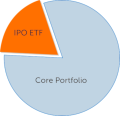Biotechs have dominated the IPO landscape recently, with the current two-week stretch expected to include 13 biotech IPOs, more than double the number seen in any two-week period since 2000. Already, 12 biotech IPOs have priced this year, but investors have had mixed reactions to these risky companies. While Dicerna (DRNA) and Ultragenyx (RARE) had record-breaking first-day returns of 207% and 101%, respectively, both have fallen sharply since. uniQure (QURE) had the unusual distinction of breaking issue after pricing 21% above the midpoint of its range. Overall, more than half of 2014’s biotechs IPOs have posted negative returns.
| 2014 Biotech IPOs | ||||
| Company (Ticker) | Business | Deal Size ($mm) | First-Day Return | Return as of 2/5/14 |
| Dicerna Pharmaceuticals (DRNA) | Liver disease and cancer treatments | $90 | 207% | 124% |
| Ultragenyx Pharmaceutical (RARE) | Genetic disease treatments | $121 | 101% | 72% |
| Auspex Pharmaceuticals (ASPX) | CNS disorder treatments | $84 | 31% | 31% |
| GlycoMimetics (GLYC) | Sickle cell episodes and AML treatments | $56 | 13% | 17% |
| Cara Therapeutics (CARA) | Pain treatments | $55 | 17% | -4% |
| Celladon Corporation (CLDN) | Systolic heart failure treatment | $44 | 2% | -4% |
| Trevena (TRVN) | Pain and acute heart failure treatments | $65 | -7% | -4% |
| Genocea Biosciences (GNCA) | Vaccines for infectious diseases | $66 | -8% | -8% |
| uniQure (QURE) | Gene therapy products | $92 | -14% | -14% |
Rare disease treatments still generating interest
While most of these early 2014 biotech IPOs have struggled, many of the pieces that drove last year's boom remain in place: More than half of the 2013 biotech IPO class is still up by 50% or more; the FDA's accelerated approval pathways have reduced the time needed in development; M&A activity has raised valuations industry-wide; and the backlog from previous years’ slow markets could still be substantial. In general, the returns of Ultragenyx and Dicerna show that interest in differentiated, well-run biotechs remains high. Both Ultragenyx and Dicerna target rare diseases with little competition and both are run by experienced executives. Ultragenyx's CEO was a long-time CMO of BioMarin, and Dicerna's CEO co-founded Sirna Therapeutics, which was sold to Merck for $1.1 billion in 2006. In contrast, several of the worst-performing biotech IPOs this year have focused on large, hotly contested markets for pain (Cara and Trevena) or heart failure (Celladon and Trevena).
| Scheduled Biotech IPOs | |||
| Company (Ticker) | Business | IPO Price Range | Deal Size ($mm) |
| Revance Therapeutics (RVNC)* | Enhanced formulations of botulinum toxin | $14-$16 | $75 |
| Concert Pharmaceuticals (CNCE) | Spasticity and diabetic kidney disease treatments |
$12-$14 | $65 |
| Flexion Therapeutics (FLXN) | Injectable pain treatments | $12-$14 | $65 |
| Eleven Biotherapeutics (EBIO)* | Dry eye disease treatments | $13-$15 | $60 |
| Argos Therapeutics (ARGS) | Immunotherapies for cancer and HIV | $13-$15 | $60 |
| Egalet (EGLT)* | Pain treatments | $11-$13 | $42 |
| NephroGenex (NRX) | Kidney disease treatments | $12-$14 | $40 |
Biotech boom continues despite weak market
While biotech IPO performance has been inconsistent, the 23% average IPO return for the sector year-to-date is impressive against the backdrop of an otherwise weak market. The average return for non-biotech IPOs thus far in 2014 is only 8%, and the average aftermarket return, as measured by the Renaissance IPO ETF (symbol IPO), is -1%. The high pricing activity (the 17 IPOs last month were the most in January since at least 1995) is also surprising in light of volatility levels. On Monday the VIX reached 21 – its highest point since December 2012. IPO activity is adversely affected when VIX climbs above 25.


